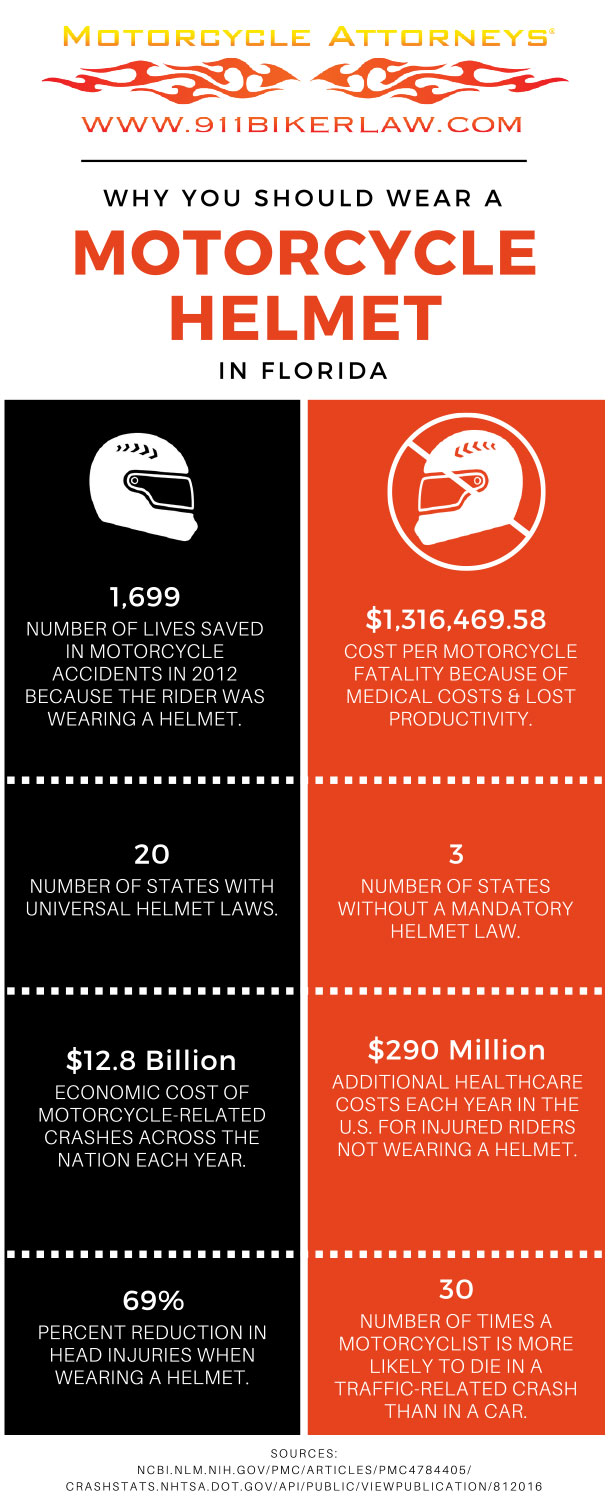Florida Motorcycle Helmet Laws
Florida is a popular destination for motorcyclists of all ages. Daytona Bike Week and other motorcycle-centric festivals each year draw thousands of enthusiasts. Though Florida hasn’t had a mandatory helmet law since 2000, the current law requires riders wear Department of Transportation (DOT)-approved helmet unless:
- The rider is over 21-years-old AND
- Is covered by an insurance policy with at least $10,000 in medical benefits for injuries sustained in a motorcycle accident.
Here at 911 Biker Law, our motorcycle accident attorneys love spending time on our motorcycles when we’re not helping clients. And the one thing we do every time we get on our bikes is wear a helmet.
Why You Should Wear A Helmet When Riding
Though Florida’s helmet law is considered partial, there are still many reasons to wear a helmet at all times while riding your motorcycle. Along with the three reasons for wearing a helmet when riding listed below, consider the best reason as it’s one more layer of protection for you. But if you were injured, even when wearing a motorcycle helmet, contact an Orlando motorcycle accident attorney with 911 Biker Law to discuss a personal injury claim.
You’re Protected From Road Debris
One thing drivers of other vehicles aren’t directly affected by is road debris. Material such as lumber or rock being hauled by other vehicles can enter the roadway, possibly striking you or your motorcycle. A helmet also protects your eyes from dust and other particulate floating in the air.
Lowers Your Risk of Head Injuries
The National Institute of Health found non-helmeted riders have a higher incidence of traumatic brain injury (TBI) than helmeted riders. Non-helmeted riders with a TBI also have medical costs 13 times higher than helmeted riders due to the injury severity.
Raises Your Visibility To Other Drivers
Helmets generally have a reflective coating on the outer shell. This makes it and you more visible in the bright sun or at night when drivers are using headlights.
How A Helmet Works To Protect You
Wearing a helmet is a great way to protect yourself while riding, but it’s one part of protection. It’s also recommended to always wear:
- Full-fingered gloves
- A jacket
- Long pants
- Boots
The goal of any helmet is to reduce the risk of a head and/or brain injury in an accident. Your head and/or brain is injured by the accident force or impact to the head. These four main components make up any helmet:
- Rigid outer shell
- Impact-absorbing liner
- Comfort or fit padding
- Chin strap
The following are how the parts of a helmet protect your head in the event of an accident. Should you be injured in a motorcycle accident, a motorcycle injury lawyer with 911 Biker Law can help you navigate a personal injury claim and fight for due compensation for your injuries.
Deceleration of Brain Movement
During a crash, the brain moves inside your skull in the same motion as crash force moves your entire body. A helmet decelerates the brain and skull’s movement as the impact-absorbing liner and comfort padding absorb some of the impact force. This allows the brain to ultimately strike the skull at a lower force.
Spreads Impact Over A Larger Area
Between the helmet shell, liner, and inside padding, these components spread impact force over a larger area than a single point of the head.
Indirect Impact
A helmet acts as a mechanical barrier between your head and an impacting object, such as a roadway or even the motorcycle itself.
What Happens If You Don’t Wear A Helmet
Many riders take to Florida’s roadways daily not wearing a helmet and arrive safely at their destination without incident. It’s a misconception, but the majority of motorcycle accidents aren’t caused by riders speeding down the road, instead other vehicles.
Riders without a helmet are at risk of two types of head injury during an accident, open or closed head injury. But why take the risk? Any head injury can have a short- and long-term financial and emotional impact on you and your loved ones. If you’ve been injured, contact the Orlando motorcycle accident lawyers with 911 Biker Law. We help motorcyclists file personal injury claims and recoup due compensation for the injury.
Open Head Injury
An open head injury happens when either the skull is fractured because of the accident impact or is penetrated by an object.
Closed Head Injury
According to the Centers for Disease Control and Prevention, most TBIs come from closed head injuries in a motorcycle accident. A closed head injury happens when the brain strikes the skull due to an external impact, but no skull fracture or penetration occurs. Concussions are common examples of a closed head injury.
Orlando Motorcycle Accident Attorneys
At 911 Biker Law, we're motorcycle enthusiasts who happen to be motorcycle accident attorneys. Our enthusiasm goes beyond the joys of riding to include safe riding for motorcyclists of all experience levels. We see the effects of motorcycle accidents every day and always advocate helmet use, even if you’re riding around the neighborhood. But if you’re injured in a motorcycle accident, contact 911 Biker Law to speak with a skilled and experienced Orlando motorcycle accident lawyer. We fight for your rights as a motorcyclist and to maximize your total compensation.



